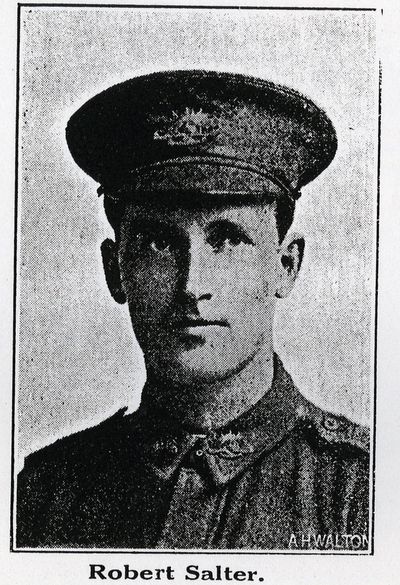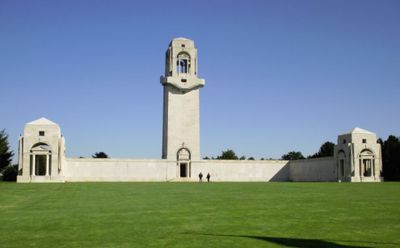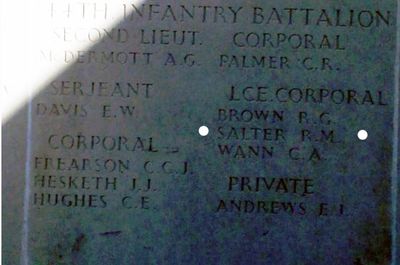Difference between revisions of "Robert Melville Salter"
From Our Contribution
| Line 81: | Line 81: | ||
| − | The 16th Battalion landed on the Gallipoli Peninsula at 5:30pm on 25 Apr 1915. On 21 May 1915 Robert received a shrapnel wound to his right arm. Evacuated first to Lemnos island, he spent 10 days there before being evacuated on [[ | + | The 16th Battalion landed on the Gallipoli Peninsula at 5:30pm on 25 Apr 1915. On 21 May 1915 Robert received a shrapnel wound to his right arm. Evacuated first to Lemnos island, he spent 10 days there before being evacuated on [[HMS Clacton]] to Malta's Intarfa Military Hospital which he reached on 5 Jun 1915, before being transferred to the Valetta Military Hospital on 24 Jul 1915 and then to the St David's Hospital, also on Malta, on 9 Aug 1915. He embarked the same day for England where he entered the All Saints Hospital in Pembroke. Declared fit for Active Service again on 8 Sep 1915, he embarked on the [[HMT Karoa]] to return to Alexandria. |
Revision as of 19:51, 15 January 2023
 The Drill of the Foot-Hills 1917 Feb-Mar edition p.13 | |
| Personal Information | |
|---|---|
| Date of Birth | unknown 1886 |
| Place of Birth | Albany, Western Australia |
| Death | 30 Mar 1918 |
| Place of Death | Sailly-le-sec, France (1st Mourlancourt) |
| Age at Enlistment | 28 years, 3 months |
| Description |
5'6½" (1.69m) tall ; 142 lbs 64.41 kg ; fair complexion ; grey eyes ; fair hair ; Scar under each eye. |
| Occupation | Bullock Driver |
| Religion | Congregational |
| Address | 'Golden Gate', Kelmscott, Western Australia |
| Next of Kin | Mother , Mrs Ellen Elizabeth Gilmour Salter |
| Military Information | |
| Reg Number | R394 |
| Date of Enlistment | 21 Sep 1914 |
| Rank | Lance Corporal |
| Unit/Formation | 16th Battalion at Gallipoli, served in France with 44th Battalion, 7th Reinforcements / 4th Brigade, 4th Division |
| Date of Embarkation | 22 Dec 1914 ‒ 1 Feb 1915 |
| Ship Embarked On | HMAT A40 Ceramic Melbourne to Alexandria, Egypt |
| Date of Embarkation | 29 Jan 1917 ‒ 27 Mar 1917 |
| Ship Embarked On | HMAT A28 Miltiades |
| Date of Return | 11 Apr 1916 ‒ 14 May 1916 |
| Ship Returned On | HMAT A54 Runic |
| Fate |
Wounded in Action 21 May 1915, Dardanelles Returned to Australia Missing in Action 30 Mar 1918 near Sailly-le-Sec Killed in Action 30 Mar 1918 confirmed by Court of Enquiry |
| Monument |
Armadale War Memorial (Bedfordale panel) Bedfordale Roll of Honour Kelmscott War Memorial (South panel) Villers-Bretonneux Memorial Armadale and Districts Roll of Honour Australian War Memorial |
| Medals |
1914-15 Star British War Medal Victory Medal |
Pre War
Robert Melville Salter was born Robert Melville Smith; son of Robert Smith according to the birth registration. Robert Melville's mother Ellen Elizabeth Gilmore Best later married Samuel Salter Jr of Kelmscott around a year later.
War Service
An original member of the 16th Battalion which undertook preliminary training at Blackboy Hill before going to Melbourne, serving in 8 Platoon, 'B' Company. The 16th Battalion embarked on the HMAT A40 Ceramic in Melbourne and it was one of the ships that sailed in convoy from Albany on 31 Dec 1914. After training in Egypt the battalion proceeded to join the Mediterranean Expeditionary Force on 12 Apr 1915 aboard the HMT Haida Pascha. The route to Gallipoli was via Mudross Harbour on Lemnos Island.
Before leaving Egypt, in one of his letters home
...."I was in Cairo Saturday night. It is amazing. The buildings in some parts are better than anything I saw in Perth, Adelaide or Melbourne, while within a hundred yards of those places you find yourself in some of the lowest slums in the world - narrow crooked alleys leading in every direction, with the houses meeting overhead, and everywhere the smell is awful."
The 16th Battalion landed on the Gallipoli Peninsula at 5:30pm on 25 Apr 1915. On 21 May 1915 Robert received a shrapnel wound to his right arm. Evacuated first to Lemnos island, he spent 10 days there before being evacuated on HMS Clacton to Malta's Intarfa Military Hospital which he reached on 5 Jun 1915, before being transferred to the Valetta Military Hospital on 24 Jul 1915 and then to the St David's Hospital, also on Malta, on 9 Aug 1915. He embarked the same day for England where he entered the All Saints Hospital in Pembroke. Declared fit for Active Service again on 8 Sep 1915, he embarked on the HMT Karoa to return to Alexandria.
Arriving in Alexandria on 12 Sep 1915, his health was checked and then on 2 Oct 1915 he was shipped on the HMT Manitou to Mudros, to rejoin the 16th Battalion on 11 Oct 1915. Following the evacuation of Anzac Cove, he embarked on the HMAT A11 Ascanius in Mudross with his unit for Alexandria on 30 Dec 1915. Back in Egypt, on 4 Jan 1916 Robert was admitted to hospital in Ismailia, and then quickly transferred to the 2nd Australian General Hospital at Ghezireh with cerebral spinal meningitis. He remained in hospital until 11 Apr 1916 when he was embarked on HMAT A54 Runic for return to Australia until recovered.
With improved health, he returned to duty in Australia on 13 Sep 1916 and re-embarked, this time for England, on 29 Jan 1917 as part of the 7th reinforcement draft for the 44th Battalion. On his journey to England, Robert spent 2 days in the ship's hospital mid voyage. On arrival in England Robert was sent to the 11th Training Battalion at Fovant where he contracted mumps requiring a period in Fargo Military Hospital (13 - 30 Jul 1917). He proceeded to France from Southampton on 23 Oct 1917 and a week later joined the 44th Battalion in the Hazebrouck area on the French/Belgium border. On 20 Nov 1917 Robert was appointed Lance Corporal. Suffering with scabies, on 8 Dec 1917 Robert attended the 10th Field Ambulance, which on 21 Dec 1917 passed him to the 1st Australian Casualty Clearing Station. Following treatment he returned to his battalion on 12 Jan 1918.
On 30 Mar 1918, the 44th Battalion war diary records one OR [Other Rank i.e. enlisted man] missing in action for the day. The Australian War Memorial holds a Red Cross file that has a number of statements by men who knew Robert in relation to his death.[1] The following statement made by Lance Corporal Gillen from the 44th Battalion gives an insight into Salter's demise albeit the date clashes with the war diary.
"No 394 Lcpl Salter RM, left our lines on the Ancre (Somme front) on 28.3.18 at about 11pm in company with Sergeant Dewer, 44th Battalion, ('B' Company). I do not know his regimental number. They went out to look for an outpost in No Man's Land, but could not find it and in searching for it, ran into an enemy outpost. Corporal Slater and Sergeant Dewer ran for it, but the former never reached our lines again. Another informant called him "Bob", knew him well because they played Bridge together quite often, said that he had heard from Sgt Dewer that Salter had been killed by a rifle shot.
Sgt Dewar's own statement is a little different.
"Pte Salter was in my platoon and on the night of the 29 Mar 1918 went with me on a patrol and we came under enemy fire at close range so that we had to move back. Salter moved away to my right and I regret to say that from that time he has not been seen. The enemy fire was heavy machine gun and rifle fire, and I am afraid that he must have been killed. I personally went over most of the same ground again a few hours later but could not find him. We were only about 40 yards from the enemy when they opened fire. ..I personally regret the incident as he was one of the best men in the platoon, and could always be relied upon. He had served in Gallipoli and came from Kelmscott being well known by several other men of the company who came from the same district. ...In forwarding this information to his Mother the members of the platoon would like her to know that they sympathize with her in her great loss.
Notes
"Robert Salter enlisted 21st September. 1914, sailed with the 16th Battalion to Egypt; fought through the Gallipoli campaign, and was wounded 21st May 1915. Returned to duty, took part in the evacuation, fell ill in Egypt, was invalided to Australia, and was on the point of returning to the front at the time of going to press."[2]
References
- ↑ https://s3-ap-southeast-2.amazonaws.com/awm-media/collection/RCDIG1051302/document/5638973.PDF accessed 28 Apr 2018
- ↑ "The Drill of the Foot-Hills" (PDF) (1917). Western Australia. Mar 1917. p. 7. Retrieved 16 May 2017 – via State Library of Western Australia.

